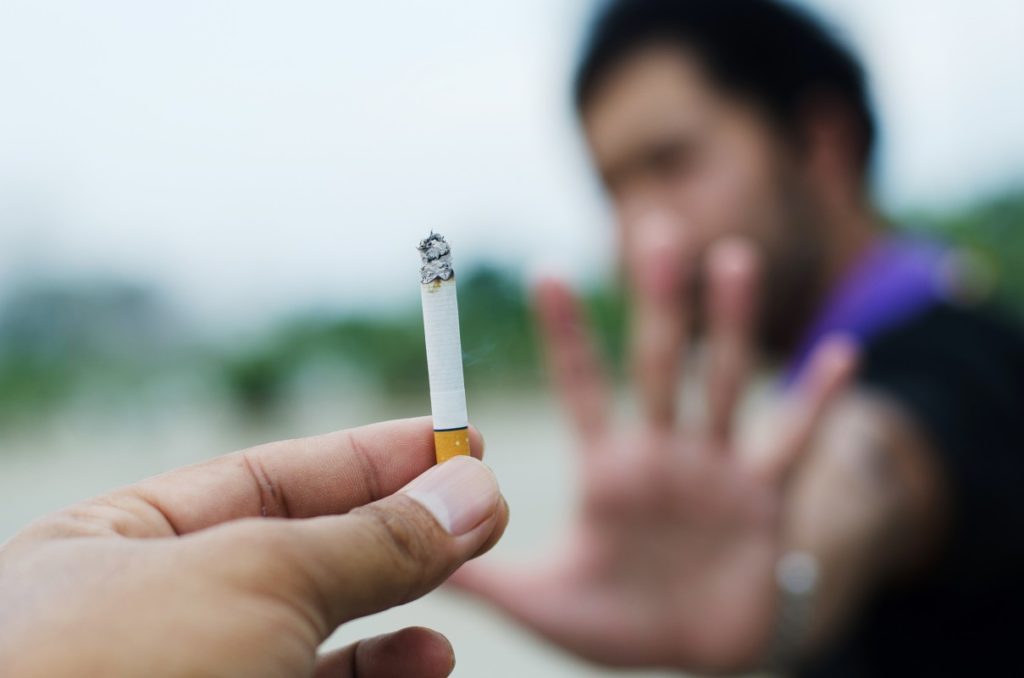7 Reasons To Seek Addiction Treatment
Substance use disorder, which is more colloquially known as drug addiction, is a serious mental...
toll free: 844.955.3042
local tel: 561.464.6505
fax: 561.450.6637
info@recointensive.com
RECO Intensive
140 NE 4th Avenue
Delray Beach, FL 33483
Many individuals undergoing inpatient or outpatient addiction treatment are cigarette smokers as well. Most addiction treatment centers allow their clients to smoke because of a belief that the additional withdrawal symptoms from sudden cessation of nicotine may add to the challenges of detox. Less than 1/3 of addiction treatment centers offer evidence-based stop-smoking programs to their clients.1
However, not only is nicotine a highly addictive substance in and of itself, research is making clear the connection between smoking cigarettes and substance abuse, including the role of cigarettes as a gateway drug and a higher likelihood of relapse among smokers who achieve sobriety.
Let’s explore these connections and the advantages of stopping smoking as part of the recovery process.
There are numerous connections between smoking and mental health issues, including addiction. Used in combination, the physical effects can be severe. Just some of the documented links between cigarette smoking and having a substance use disorder include:
There are some common misconceptions about cigarette smoking and drug use, which can stand in the way of patients in outpatient drug rehab centers or sober housing from getting the help they need to stop smoking. Some of these perpetuated myths are that:
In reality, smoking cessation has not been shown to interfere with addiction treatment, and it can be managed alongside the detox from other substances. When asked, many people in recovery are interested in safely breaking their addiction to cigarettes, but these myths play a role in preventing them from taking that step.
A prominent study has shown that those who smoke cigarettes following a detox program are about twice as likely to relapse in the three years following treatment. Of those who kept smoking during those three years, 11% relapsed into substance use, compared to 8% of those who quit smoking and only 6.5% of those who had never smoked cigarettes.2
Suspected reasons for this connection include a theory that cigarettes may be a trigger for drug use, causing cravings for opiates and stimulants. The study found that stopping smoking during or following inpatient or outpatient addiction treatment did not increase other drug use, and it suggested that doing so may improve abstinence over the long term.
There does seem to be a strong connection between smoking cigarettes and illicit substance use. Teenagers who smoked were found to be three times more likely to engage in underage drinking, eight times more likely to smoke marijuana, and twenty-two times as likely to use cocaine than non-smoking teenagers.3 Smoking cigarettes was also linked to other high-risk behaviors and youth violence.


Some of the reasons that individuals and treatment programs should consider adding smoking cessation to their treatment plans include:4
Many people become addicted to cigarettes early in life, with smoking rates for teenagers and young adults being higher than any other age group. As many as 20% of high school students are regular smokers,3 which will increase their likelihood of substance use and addiction.
It is believed that many teenagers and young adults use nicotine as self-treatment for mental health disorders. Compared to the 20% rate for all high school students, as many as 90% of individuals who have a co-occurring mental health disorder smoke.3
Once tobacco use starts, addiction sets in quickly. While it was long thought that it takes 2-3 years to become addicted to nicotine, recent studies now show that, especially for young people, addiction can begin in as little as two days to one month from smoking their first cigarette.3
Smoking as few as 100 cigarettes (five packs) produces physical and psychological withdrawal when nicotine use is stopped.3
The younger a person is when they start smoking, the more likely they are to become addicted and the less likely they are to be able to quit smoking successfully.3
There are many effective methods to stop smoking or treat nicotine addiction. The FDA has approved several medications for smoking cessation, and behavioral therapy also has been proven successful. The more individualized and focused the treatment plan, the more successful it is likely to be.
Some of the methods that are effective for stopping smoking include:5


Living free of addiction requires more than just achieving sobriety from drugs or alcohol. Caring for and supporting your overall wellness is a necessary part of living a full and rich life after addiction treatment. Choosing a treatment facility that offers supportive programs and partnerships to achieve all of your recovery goals will get you well on your way to restoring your mind, body, and spirit.
We offer a broad suite of services to ensure that our clients have all the tools and resources they need to stop their addictions to all kinds of substances. With intensive outpatient therapy, detox facility partnerships, and RECO Institute’s sober living residences, your road to recovery can be complete and all-encompassing.
Quitting smoking as part of your recovery plan will decrease your risk of relapse, improve your overall health, and help eliminate the family cycle of smoking and addiction. If you are wondering how to get started on this journey in Delray Beach, Florida or nearby, contact us at RECO Intensive for comprehensive outpatient addiction treatment.
Sources: